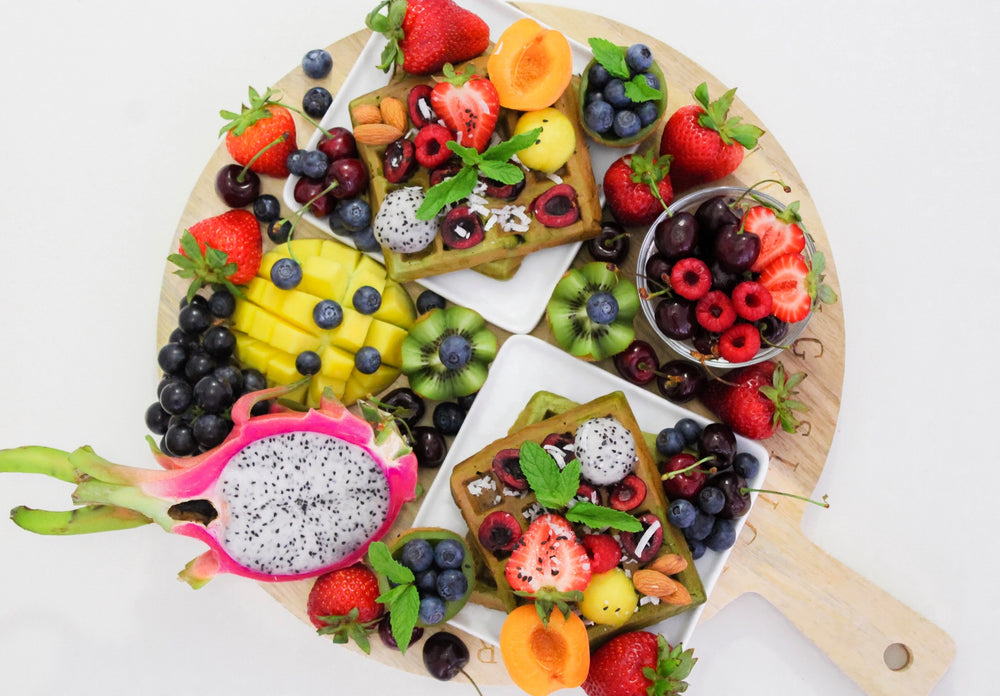
What Is a Superfood: The Science Behind
“Superfood” has become a popular buzzword in the world of health and wellness. You may assume that foods that tout this coveted label are endowed with miraculous properties, from disease prevention to enhanced longevity.
Eating more superfoods can certainly supercharge your health, but the full story is a little more complex. So, what is a superfood? And do these foods truly possess superior attributes?
Below, we’ll define what gives a food “superfood status” and review some popular examples. After that, we’ll break down the evidence-backed benefits of adding more superfoods to your diet.
What Is Superfood?
Superfoods are foods that boast impressive nutrient density relative to their calorie content. For example, these nutritional powerhouses are often rich in:
- Antioxidants, which protect cells from oxidative damage, potentially reducing your chances of developing chronic diseases.
- Vitamins, which support several key bodily functions, from immune support to energy production.
- Minerals, which help ensure healthy nerve function, fluid balance, and bone strength.
-
Fiber, which enhances digestion, blood sugar regulation, and feelings of satiety.
While most health enthusiasts adhere to this definition, it’s important to note that the term "superfood" is not legally recognized by regulatory bodies, such as the Food and Drug Administration (FDA). Thus, anyone can label a food as a “superfood,” and many marketers do so to boost sales.
Despite this recent marketing trend, Indigenous civilizations have revered these foods for years — thanks to their rich nutritional profiles and suspected medicinal benefits. The term “superfood” is just a modern way of communicating that sentiment.
6 Types of Superfoods
Now that you know the definition of superfoods, let’s take a look at some notable examples to fill your plate with.
#1 Greens
Dark, leafy greens, such as spinach, kale, and Swiss chard are packed with antioxidants, vitamins A, C, E, and K, several B vitamins, iron, magnesium, potassium, calcium, and fiber. Greens are also quite low in calories. Thanks to this combination of components, greens are a perfect example of a superfood.
Since many people struggle to consume enough greens in their diet, green powders have also become a popular superfood dietary supplement.
#2 Berries
If you’re looking to get more antioxidants in your diet, berries deliver. Berries are rich in flavonoids, antioxidants, vitamins, and minerals. They also contain less sugar than other fruits, making them a stand-out sweet snack for health-conscious eaters.
Besides the more commonly known varieties like blueberries and raspberries, a whole host of more exotic berries are celebrated as superfoods. Some examples include Camu Camu, goji, acai, and sea buckthorn.
#3 Mushrooms
Earthy, savory, and endlessly versatile, mushrooms are a tasty addition to a well-rounded meal. Their impressive nutrient profile has also elevated them to “superfood” status in recent years. Not only are mushrooms low in calories, but they also contain:
- B vitamins, such as riboflavin, niacin, and pantothenic acid
- Minerals, such as selenium, copper, and potassium
- Antioxidants, such as ergothioneine and glutathione
Adaptogenic mushrooms also contain beta-glucans and polysaccharides, which have been associated with immune-modulating, anti-inflammatory, and stress-mediating effects. In addition, some mushrooms with exposure to ultraviolet light can offer extra vitamin D.
#5 Ancient Grains
From quinoa to farro, ancient grains are prized for their robust nutritional profiles. These superfoods contain more protein, vitamins, minerals, and antioxidants than modern rice or wheat. Since ancient grains are packed with fiber, they also cause a slower rise in blood sugar than their refined counterparts.
For example, the small but mighty chia seed is an excellent source of fiber and antioxidants. These seeds also contain many minerals, including phosphorus, magnesium, iron, and zinc. Whether you toss them into a smoothie or sprinkle them over your salad, chia seeds can pack a nutritional punch for just 100 calories per ounce.
#6 Prebiotics
You’ve probably heard how powerful probiotics can be for your gut health. Unfortunately, when taken in supplement form, probiotics have some limitations — many strains require special handling and delivery formats to keep them alive by the time they reach the intestines.
Fortunately, these limitations can be overcome with the help of prebiotics.
Prebiotics are essentially food for probiotics, enabling probiotic microorganisms to live and flourish inside the digestive tract. The two most common forms of prebiotics are oligosaccharides (short chains of carbohydrates found in several vegetables) and polyphenols (commonly found in fruits).
Read more: Complete List of Superfoods to Add to Your Diet
Benefits of Superfoods
Eating more foods that are rich in antioxidants, vitamins, minerals, and fiber may support your:
-
Heart health – Some antioxidants have been shown to reduce oxidative stress and inflammation in the cardiovascular system, which has been shown to support heart health. Meanwhile, magnesium and potassium may help optimize blood pressure levels, while fiber may help lower cholesterol.
-
Weight management – By increasing feelings of fullness, fiber-rich foods can reduce your hunger and subsequent calorie intake, making weight management easier. Consuming more nutrient-dense foods can also ensure you satisfy your nutrient requirements while eating a lower-calorie diet.
-
Optimal energy levels – Several vitamins and minerals can support steady energy levels. For example, B vitamins can help convert food into usable energy, while iron-rich foods can help transport oxygen throughout your body.
- Overall wellness – In addition to these benefits, nutrient-dense superfoods can promote overall wellness by giving your body the building blocks it needs to function at its best.
Since superfoods contain so many beneficial compounds, they’re a valuable addition to a balanced diet. However, they’re not cure-alls on their own. Rather than hyper-focusing on specific superfoods, you should strive to eat a diverse plate of foods and live a healthy lifestyle.
Another misconception about superfoods is that they’re expensive or hard to find. While some are pricier than others — goji berries and spirulina are two examples that come to mind — many superfoods are easily accessible and affordable.
Reap the Benefits of Superfoods With Vibrant Health
Superfoods can provide a lot of bang for your buck nutritionally. And luckily, consuming more of these powerful foods is easy — even without the grocery trip. Simply add a superfood supplement to your daily routine, like Vibrant Health’s Green Vibrance Superfood Powder.
Packed with a comprehensive blend of 120+ ingredients serves up your daily dose of vitamins, minerals, antioxidants, and probiotics. If you’re ready to supercharge your health, give this superfood supplement a try today.
Why Trust Vibrant Health?
At Vibrant Health, we’ve been pioneers in science-backed nutrition for over 30 years, formulating transparently sourced superfood supplements that prioritize real results. Our blog is an extension of that commitment—a trusted resource for expert-driven wellness insights.
Every article is crafted with nutrition expertise, backed by the latest scientific research, and reviewed by our in-house Certified Health Coaches and Product Educators. We break down complex health topics into practical, actionable advice—helping you make informed choices about superfoods, supplementation, and holistic wellness.As a brand that has earned thousands of 5-star reviews and the trust of health professionals, we ensure that our content reflects the same quality, integrity, and transparency as our products.
Your wellness journey deserves accurate, credible, and empowering guidance. That’s why Vibrant Health’s blog is here—to help you live a healthier, more vibrant life, backed by real expertise


